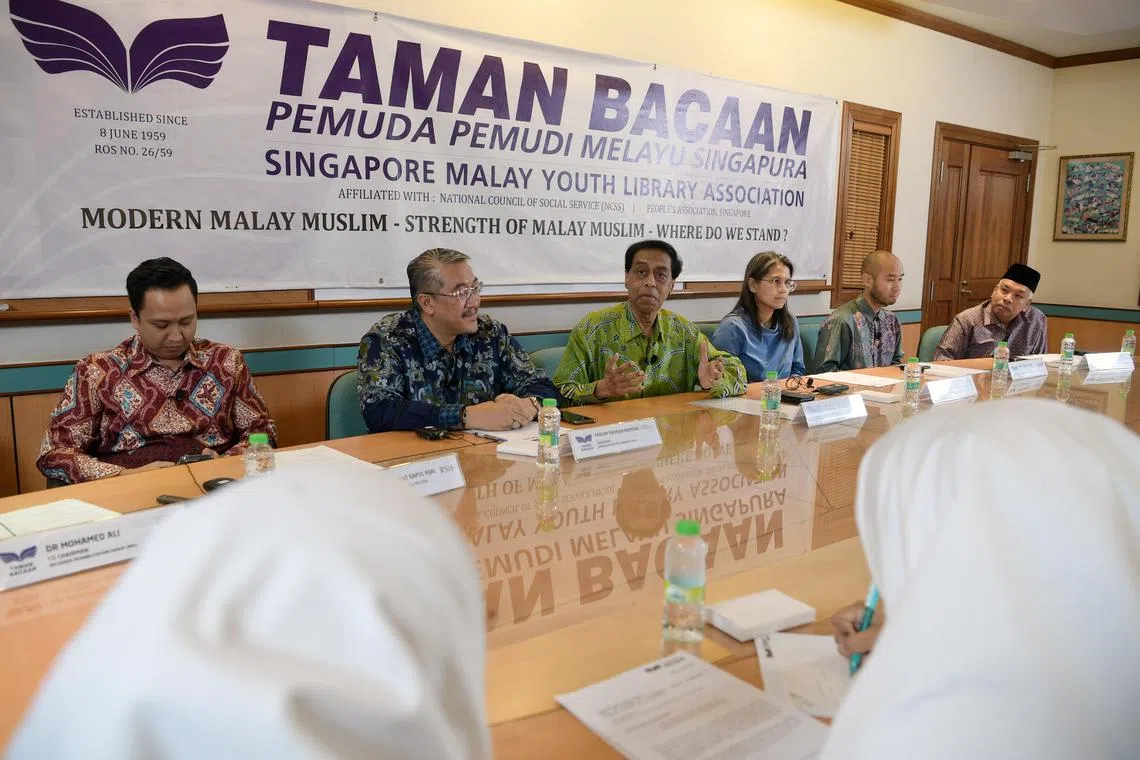Seminar spotlight on what youth can do to guard against radicalisation
Sign up now: Get ST's newsletters delivered to your inbox

Mr Abdul Halim Kader (centre, in green), president of community group Taman Bacaan, said more must be done to tackle the problem of youth radicalisation.
ST PHOTO: NG SOR LUAN
SINGAPORE – The youth have a crucial role to play in guarding against radicalisation and extremism by sounding out to their teachers, parents and the authorities when they come across peers who may be at risk.
Mr Abdul Halim Kader, president of community group Taman Bacaan, or Singapore Malay Youth Library Association, said the trend of more youth becoming radicalised here is worrying, and that more must be done to tackle the problem.
“If this trend of more youth and students becoming involved in violent extremist ideologies continues, I think we are going to be in trouble,” he added. “The younger generation must take on the role to look out for their peers, so they can play their part in ensuring Singapore continues to be a safe nation.”
Mr Abdul Halim was speaking at a seminar on countering violent extremism on Saturday.
The event, titled Role of Youths in Countering Extremism and Strengthening Social Cohesion, was organised by Taman Bacaan in collaboration with the Inter-Agency Aftercare Group (ACG) and the Religious Rehabilitation Group (RRG). It was held at Taman Bacaan’s premises in Jalan Damai and broadcast online.
The seminar drew 30 students from Madrasah Alsagoff Al-Arabiah.
It came after the recent case of a self-radicalised 18-year-old student
He also made plans to stab and kill non-believers in dark alleys, carry out a mass-casualty attack at Amoy Quee Camp by recruiting a suicide car bomber, and construct a C4 explosive device to bomb the Keramat Habib Noh grave site at Haji Muhammad Salleh Mosque in Tanjong Pagar.
He was detained in December 2022.
Nine people below the age of 21 have been dealt with under the Internal Security Act (ISA) since 2015,
In March 2021, it was reported that a then 20-year-old full-time national serviceman had been detained under the ISA after planning to use a knife to attack and kill Jews here
In January 2021, it was reported that a then 16-year-old Singaporean student had been detained after making plans to attack two mosques and kill worshippers in Singapore
The Christchurch attacks in 2019 saw a lone gunman kill 51 people and injure another 40
During the dialogue segment of the seminar on Saturday, the students discussed with panellists from ACG and RRG the role of social media and what more could be done to prevent youth here from becoming radicalised.
There was also a presentation by Mr Ahmad Saiful Rijal Hassan, an associate research fellow with the International Centre for Political Violence and Terrorism Research at the S. Rajaratnam School of International Studies.
He spoke about how some of the youth detained here had taken the path of radicalisation after coming across materials from terrorist groups like ISIS online.
Mr Abdul Halim noted that it is important that the younger generation and their parents stay engaged
He said: “We need to move into the schools so we can spread awareness and the youth can understand the dangers.
“I also urge parents who are worried about their children to quickly come forward when they see the signs, and to approach the authorities or ACG or RRG for help. There is no shame in asking for help.”
He added that when a person is radicalised, the whole community needs to come together to help rehabilitate the person and support the family.
“The support provided by ACG demonstrates the community’s sentiment not to ostracise and neglect these families,” he said.
“Instead, it shows them that the community cares and will support them in ways that will augment their daily lives and give them confidence to move on and build a better future.
“The community must always play an active role to protect the peace and stability in Singapore.”



